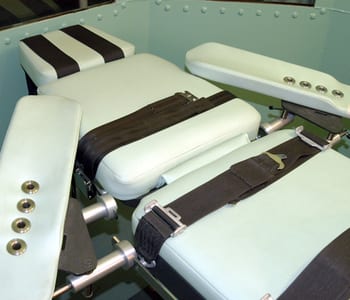This undated photograph shows a close-up of the table where executions are carried out by lethal injection at San Quentin State Prison in California. (CNS photo/courtesy of California Department of Corrections)
March 13, 2019
Catholic San Francisco
California Gov. Gavin Newsom declared a moratorium on the use of the death penalty in the state, a step the state’s Catholic bishops said provides a welcome pause for “civil dialogue” on alternatives to capital punishment.
“The death penalty has been an abject failure,” Newsom said in a March 13 Twitter post. “It discriminates based on the color of your skin or how much money you make. It’s ineffective, irreversible, and immoral. It goes against the very values that we stand for — which is why CA is putting a stop to this failed system.”
Newsom signed an executive order placing a moratorium on the death penalty, withdrawing California’s lethal injection protocols and immediately closing the execution chamber at San Quentin State Prison. The order does not provide for the release of any individual from prison or otherwise alter any current conviction or sentence.
“The intentional killing of another person is wrong and as governor, I will not oversee the execution of any individual,” Newsom said in a press release. “Our death penalty system has been, by all measures, a failure. It has discriminated against defendants who are mentally ill, black and brown, or can’t afford expensive legal representation. It has provided no public safety benefit or value as a deterrent. It has wasted billions of taxpayer dollars. Most of all, the death penalty is absolute. It’s irreversible and irreparable in the event of human error.”
Newsom said there are 737 people currently on death row in California, the largest death-row population in the Western Hemisphere. One in four people on death row in the United States are in California.
He said the death penalty is unevenly and unfairly applied to people of color, people with mental disabilities, and people who cannot afford costly legal representation.
“More than six in 10 people on California’s death row are people of color,” Newsom said, noting a 2005 study that found that those convicted of killing whites were more than three times as likely to be sentenced to death as those convicted of killing blacks and more than four times as likely as those convicted of killing Latinos.
He said at least 18 of the 25 people executed in the U.S. in 2018 had one or more of the following impairments: significant evidence of mental illness; evidence of brain injury, developmental brain damage, or an IQ in the intellectually disabled range; chronic serious childhood trauma, neglect, and/or abuse.
He said the governors of three other states — Oregon, Colorado and Pennsylvania — have suspended enforcement of the death penalty. He noted that in 2018, the Washington state Supreme Court struck down the death penalty as unconstitutional and “racially biased.”
Innocent people have been sentenced to death in California, the governor said.
“Since 1973, 164 condemned prisoners nationwide, including five in California, have been freed from death row after they were found to have been wrongfully convicted,” he said. “No person has been executed since 2006 because California’s execution protocols have not been lawful. Yet today, 25 California death row inmates have exhausted all of their state and federal appeals and could be eligible for an execution date.”
Newsom said that since 1978 the state has spent $5 billion on a death penalty system that has executed 13 people.
San Francisco Archbishop Salvatore J. Cordileone, in whose archdiocese the San Quentin death chamber is located, has issued the following statement on behalf of the California Catholic Conference.
“We appreciate this recognition that the state has the adequate means to defend human dignity and public safety without recourse to capital punishment,” Archbishop Cordileone said. “We ask the governor to urge the legislature to find a permanent legislative solution that will end the practice of capital punishment in our state for good.”
He said the bishops also “also encourage the governor to use well the time of the moratorium to promote civil dialogue on alternatives to the death penalty, including giving more needed attention and care to the victims of violence and their families. Capital punishment is not a cure for the suffering and turmoil inflicted by violent crime; the restorative healing of victims and their families to the extent possible is an essential part of justice.”
He said it has long been apparent that capital punishment “is not necessary in a modern society” and noted that “repeated studies have proven that it does not serve as a deterrent, that too many innocent people are condemned, and that sentencing is too often influenced by racial, economic and other discriminatory factors.”
He said the Catholic Church has long recognizing these realities, with Pope Francis recently changing the Catechism of the Catholic Church to assert that the death penalty is “inadmissible” as an affront to the dignity of every human life.
This story originally appeared on https://catholic-sf.org


